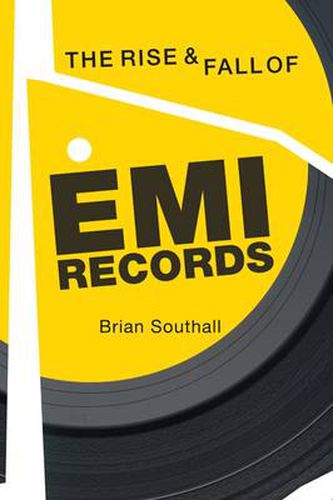Readings Newsletter
Become a Readings Member to make your shopping experience even easier.
Sign in or sign up for free!
You’re not far away from qualifying for FREE standard shipping within Australia
You’ve qualified for FREE standard shipping within Australia
The cart is loading…






This title is printed to order. This book may have been self-published. If so, we cannot guarantee the quality of the content. In the main most books will have gone through the editing process however some may not. We therefore suggest that you be aware of this before ordering this book. If in doubt check either the author or publisher’s details as we are unable to accept any returns unless they are faulty. Please contact us if you have any questions.
Electric and Music Industries Ltd (EMI) first saw the light of day in the UK in 1931. In a visionary move for the gramophone age, it manufactured both hardware (recording and playback equipment) and software (the records and tapes its machines would play). For over half a century, EMI dominated both sectors, it’s music division eventually becoming the most successful in the world with a roster that at various times included The Beatles , Maria Callas, Frank Sinatra, Cliff Richard, Pink Floyd, The Beach Boys , Queen , Robbie Williams, The Spice Girls , Kate Bush and Kylie Minogue. Then in the 1990s, things started to go wrong.This title explores and investigates EMI’s extraordinary decline from the greatness over two decades of rejected takeovers, unsuccessful mergers, executive changes, profit warnings, artist and staff cuts, press criticism and never-ending speculation. It includes interviews with many key players including former EMI Group/EMI Music executives Sir Colin Southgate, Jim Fifield, Eric Nicoli, Tony Wadsworth, David Munns, Rupert Perry, Ray Cooper and Jon Webster. He has also interviewed many managers, music journalists, financial analysists and rival record company executives. The result is the definitive account of a major international company’s travails. It is also an eye-opening expose of the speed at which the music industry has changed.
$9.00 standard shipping within Australia
FREE standard shipping within Australia for orders over $100.00
Express & International shipping calculated at checkout
This title is printed to order. This book may have been self-published. If so, we cannot guarantee the quality of the content. In the main most books will have gone through the editing process however some may not. We therefore suggest that you be aware of this before ordering this book. If in doubt check either the author or publisher’s details as we are unable to accept any returns unless they are faulty. Please contact us if you have any questions.
Electric and Music Industries Ltd (EMI) first saw the light of day in the UK in 1931. In a visionary move for the gramophone age, it manufactured both hardware (recording and playback equipment) and software (the records and tapes its machines would play). For over half a century, EMI dominated both sectors, it’s music division eventually becoming the most successful in the world with a roster that at various times included The Beatles , Maria Callas, Frank Sinatra, Cliff Richard, Pink Floyd, The Beach Boys , Queen , Robbie Williams, The Spice Girls , Kate Bush and Kylie Minogue. Then in the 1990s, things started to go wrong.This title explores and investigates EMI’s extraordinary decline from the greatness over two decades of rejected takeovers, unsuccessful mergers, executive changes, profit warnings, artist and staff cuts, press criticism and never-ending speculation. It includes interviews with many key players including former EMI Group/EMI Music executives Sir Colin Southgate, Jim Fifield, Eric Nicoli, Tony Wadsworth, David Munns, Rupert Perry, Ray Cooper and Jon Webster. He has also interviewed many managers, music journalists, financial analysists and rival record company executives. The result is the definitive account of a major international company’s travails. It is also an eye-opening expose of the speed at which the music industry has changed.